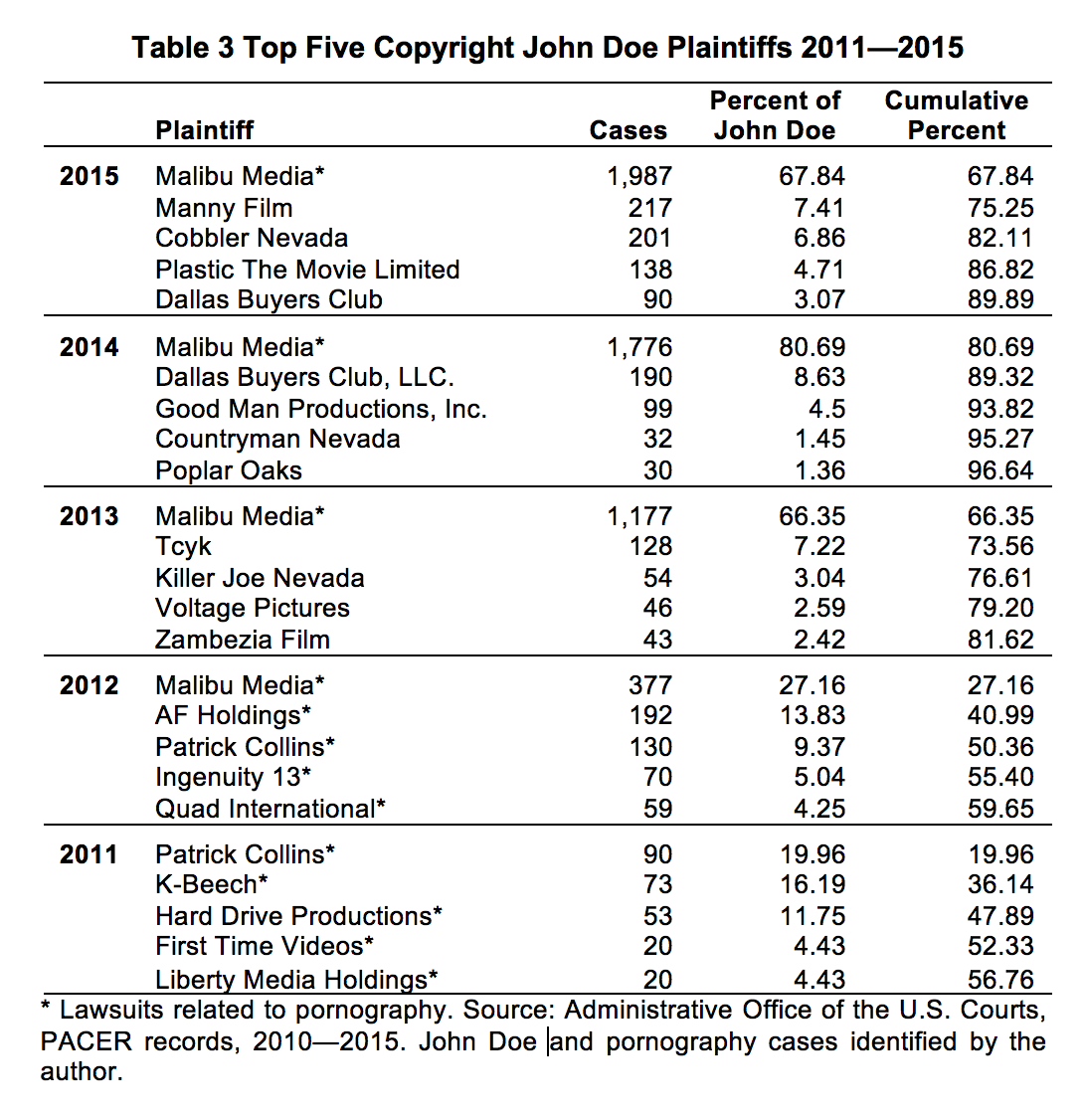WBEZ ran a story on Thursday, based in part on my research first published in the Iowa Law Review. The story, Why Are So Many People In Northern Illinois Being Sued For Downloading Porn? by Miles Bryan is an excellent overview of a complicated topic.
Focus on Chicago
Although these John Doe lawsuits are a nation-wide phenomenon, Chicago (technically, the Northern District of Illinois) is the leading destination for what many people regard as ‘copyright trolling’. The Northern District of Illinois has accounted for roughly 15% of all copyright John Doe lawsuits nationwide since 2013.
The Northern District of Illinois covers 18 counties across the northern tier of Illinois, with a population of about nine million people. The Southern District of New York which encompasses New York City and the Southern District of California which includes Los Angeles are much larger in terms of population, yet the SDNY has only had 531 John Doe cases in the same period that Chicago has seen 1603. The Southern District of California has seen a mere 165.
Since 2010 (up until June 2016) lawyers in the greater Chicago area (technically the Northern District of Illinois) have filed over 1600 John Doe copyright cases (1603 at last count). This practice is now so common in Chicago that these suits outnumber regular copyright lawsuits by a ratio of more than 4 to 1 (there were 385 regular copyright suits in the same period.)

Because of the way these suits are filed, one lawsuit can sweep in a large number of IP addresses. Based on court records, my conservative estimate of the number of IP addresses involved in one of these suits in the Northern District of Illinois since 2010 is 17,980. Not all of these cases involve pornography, but the vast majority do, 73% in the Northern District of Illinois.
In 2015 alone, Chicago court saw just 48 regular copyright lawsuits filed, and 395 John Doe copyright lawsuits.
John Doe copyright lawsuits accounted for 58% of all copyright cases filed in 2015
Across the entire country, John Doe copyright lawsuits have risen from just under 4% of all copyright filings in 2010 to more than 19% in 2011, 43% in 2012, 46% in 2013, 51% in 2014 and just under 58% in 2015.
One pornography company, Malibu Media accounted for 40% of all federal copyright cases filed in 2014 and 2015. However, data collected for the first four months of 2016 shows that Malibu Media’s influence is declining (it accounts for only a quarter of all federal copyright cases filed in 2016 so far) and that there may be fewer John Doe cases filed this year if current trends continue. Last year there were 2930 cases filed, so far this year there have been only 690. John Doe cases for the year to date account for only 39.5% of all federal copyright cases.
Why Chicago?
One of the questions that Miles asked me to think about is why this phenomenon is so prevalent in Chicago?
The first thing to note is that Chicago is not alone. New Jersey actually had more of these cases in 2015 and the Southern District of New York had only slightly less. The five leading federal districts for john doe copyright cases in 2015 were
- New Jersey – 386
- Illinois (ND) – 395
- New York (SD) – 248
- Maryland – 194
- Virginia (ED) – 153
But the Chicago cases involved many more IP addresses (almost 10 times as many!) and thus effected many more people.
Part of the answer to the question of why Chicago is that Chicago is large metro area with a lot of potential targets, so the economies of scale make it attractive to set up shop here. But that does not fully explain it. I think that another import part of the story is that judges in Chicago have not been as hostile to these suits as some judges in New York and Los Angeles.
Judges in the Northern District of Illinois are not exactly thrilled about john doe litigation, however, they has not closed the door to this kind of litigation and they are more tolerant of joining large numbers of IP addresses in a single lawsuit.
Related Publications:
Matthew Sag, IP Litigation in US District Courts: 1994 to 2014, 101 Iowa Law Review 1065-1112 (2016) (download from ssrn) Data updated for 2015 (http://ssrn.com/abstract=2711326)
Matthew Sag, Copyright Trolling, An Empirical Study, 100 Iowa Law Review 1105-1146 (2015) (download from ssrn)



